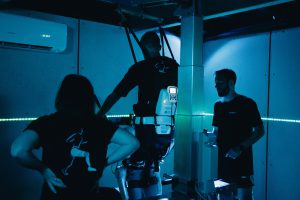If you’ve been following tappON, you may have noticed that we’ve mentioned Kieran, one of our partner exercise physiologists (he works at our sister company RoboFit). Today, we’re going to delve into just what an exercise physiologist is.
The textbook definition provided by Exercise & Sports Science Australia asserts that Exercise Physiologists are “University qualified allied health professionals equipped with the knowledge, skills and competencies to design, deliver and evaluate safe and effective exercise interventions for people with acute, sub-acute or chronic medical conditions, injuries or disabilities”.
If you’re wondering what the difference is between an Exercise Physiologist and a Physiotherapist, then you’re not alone. There’s a bit of overlap between the two fields, and both have four years of university behind them, but the main difference is at the point of intervention.

What’s the difference between a Physiotherapist and an Exercise Physiologist?
Physiotherapists tend to be responsible for Diagnosing and providing hands on treatment when it comes to a new injury or condition, in the form of massage, dry needling, and stretches etc. They can often also assist with delivering long-term rehabilitation.
Exercise Physiology usually comes in when it comes to rehabilitating from an injury or chronic condition, after a physiotherapist has already gotten involved. Typically this involves developing a unique exercise and rehab program for the client’s needs, monitoring progress and determining the long-term recovery prognosis.
An addition to treating people living with chronic injuries and physical conditions such as Spinal Cord Injury, Stroke and Multiple Sclerosis, an Exercise Physiologist can also provide healthy lifestyle education, aiming to prevent or manage chronic health conditions such as diabetes, kidney disease, heart conditions, and cardiac conditions.
Any exercise physiologist will be able to provide a comprehensive initial assessment, and then work with you to figure out your goals and the best way to get there.
If you’re curious about exercise physiology, you can reach Kieran on tappON and book an initial assessment.



